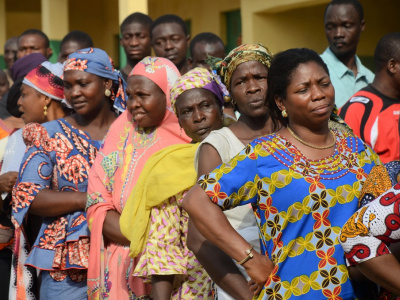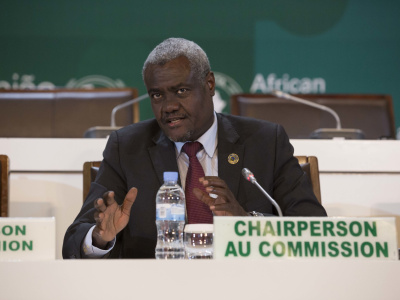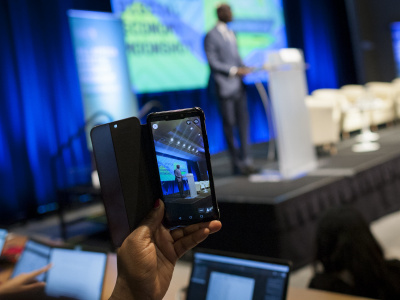
African Union Summit and elections: Something old, something new
With the African Union (AU)’s 34th Summit of heads of state taking place last weekend, it is a good time to reflect on what came out of it, and what the year ahead might hold. Along with the rotating AU chair being passed from President Ramaphosa of South Africa to President Tshisekedi of the Democratic Republic of Congo (DRC), a revised election process means that Moussa Faki of Chad became the first African Union Commission (AUC) chair to have a second term since the transformation of the Organisation of African Unity to the AU almost 20 years ago. Joined by some new faces, this indicates a degree of administrative continuity, which could be a good thing given the AUC reforms still underway, and especially, multiple ‘burning issues’. The question is what this might mean for the AU’s external partners.
New year, new AU chair
Starting over this weekend, President Tshisekedi took over the AU chair from Cyril Ramaphosa. Though arguably a symbolic position, the AU chair remains important for steering the agenda. The interests and incentives of individual leaders are key in shaping progress – as analysis of regional and continental cooperation and integration underlines.
Some might suspect that domestic political concerns will limit the capacity of Tshisekedi to dedicate himself to continental issues. Ever since his disputed election in 2018, which saw the AU and the Southern African Development Community (SADC) at loggerheads, he has faced intense opposition from the supporters of his predecessor, first as part of a coalition but progressively sidelined. Since then, he seems to have regained some leeway. Though none of his predecessors has had it easy on the domestic front either – he is preceded by Presidents Kagame of Rwanda, El-Sisi of Egypt, before Ramaphosa – Tshisekedi will also have to contend with regional political concerns around the Great Lakes region. At the same time, the DRC is almost by definition a multilateralist player, given its location, size and geography. This helps explain why it appears to have the most regional memberships in the continent.
This will be the first time the DRC chairs the AU since its establishment, and reports indicate Tshisekdi has enlisted the advice of a team to manage his term. They will have to be ready to take on the task of handling the medical and economic impact of the global coronavirus pandemic, where the DRC arguably has relevant experience, having worked with the AU and the African Centres for Disease Control (Africa CDC) in handling the Ebola virus –something that may prove invaluable as the continent tackles COVID-19. A key stated ambition in his acceptance speech was the desire to make the AU at the service of the people, with the “wide and active participation of women and youth”. On engaging women, at least, he is aided by the newly elected AU Commission.
New year, new AU Commission
As the only nominated candidate for the position of chairperson of the AUC, Moussa Faki Mahamat, was re-elected with reportedly 51 out of 55 votes. Though not entirely free from criticism, this solid support comes from his past record and the vision he laid out for the AU. That highlighted eight priorities that include finalising the institutional reform of the AU and strengthening the leadership of the AU Commission.
With her election to deputy chairperson of the AUC, Ms. Monique Nsanzabaganwa from Rwanda is the first woman to occupy this position. This had to be the case given the recently revised election rules to ensure regional representation, gender parity and merit-based selection. But by selecting a Rwandan, who will have a key role in continuing the AU reforms begun under Rwandan President Kagame, this also offers hope for continuity in that agenda.
The revised election process also brought far more scrutiny and transparency around the selection process than in the past. That said, lockdowns and travel restrictions limited the background lobbying and negotiation that are part of the election process, making it harder for prospective candidates to convince voters. Unlike the previous elections in 2017, there was no public debate held this time around, yet that process, known as ‘MjadalaAfrika’, was seen as a way of engaging more citizens in the election of the AUC leadership.
In reporting to the Assembly on the AU reforms, President Kagame underlined slow progress in the reform of judicial organs, the Pan-African Parliament, the Commission structures and the division of labour with Regional Economic Communities – “the very same items [he] highlighted at last year’s Summit.” Nonetheless, the reshuffling and merging of various departments will get underway, reducing the number from eight to six with the goal of improving the AU’s efficiency but raising questions about how they will affect the Union’s future functioning.
One case in point is the merger of the political affairs department with peace and security. While the logical link between, for instance, elections and the risk of violence is clear, some worry that the governance agenda may further lose attention by being combined with security concerns. That relates to how far heads of state are willing to let the AU ‘interfere’, and is something which President Tshisekedi is unlikely to counter: the controversy around his election at the end of 2018 had the AU issue a communiqué questioning the results and announcing a high-level delegation to follow-up, only to reconsider as the regional community SADC and then other member states endorsed Tshisekedi as the winner. Either way, the reportedly historical unanimous election of Ambassador Bankole Adeoye to the helm of the new Political Affairs, Peace and Security Department suggests strong support from member states for someone who was widely respected as Nigeria’s ambassador in Addis Ababa.
Summary of the outcome of today's @_AfricanUnion Commission #elections. Congratulations to #Chad #Rwanda #Zambia #Egypt #Angola and #Nigeria. #AUsummit2021 #AUSummit #TheAfricaWeWant pic.twitter.com/bZhMxBza5H
— Fatima K. Mohammed (@FKMohammed1) February 6, 2021
Other highlights from the elections include the re-election of Amb. Albert Muchanga to the enlarged post of Economic Development, Trade & Industry and Mining, having steered the African Continental Free Trade Area (AfCFTA) to its effective launch on 1 January this year. Other re-elections include H.E. Josefa Sacko to the post of Agriculture, Rural Development, Blue Economy & Sustainable Environment, and Dr. Amani Abou-Zeid to continue serving in the Infrastructure and Energy role. Because of the rules governing gender and regional balances and the preceding votes, the remaining two posts of Commissioner of Health, Humanitarian Affairs and Social Development and Commissioner for Education, Science, Technology and Innovation were postponed to the next meeting of the Executive Council.
New Commission, new theme
The AU’s theme for 2020 was ‘Silencing the Guns’, but by the time of the Heads of State summit in February, COVID-19 was already beginning to raise its ugly head. Coming seven years after the declaration on Silencing the Guns in Africa by 2020, and four years on from adopting a Master Roadmap, a marked reduction in armed conflict was always going to be hard to achieve. However, the reported limited progress led the AU to extend the deadline for this flagship programme to 2030.
This year’s theme is ‘Arts, Culture and Heritage: Levers for Building the Africa We Want’. While reflecting a long-term concern about maintaining and celebrating diversity in culture, heritage, languages and religion as a cause of strength, this also relates to incorporating pan-African ideals into school curricula, an element often raised in discussions of how to better connect the AU to its citizens.
Given the questioning of colonialism and ‘decolonising development’ that gathered renewed momentum last year, the objective that “Africa’s stolen culture, heritage and artefacts will be fully repatriated and safeguarded”, as stated in Agenda 2063, also gains new resonance. This theme also links to the 2020 Common African Position on Asset Recovery, as well as providing an opportunity to increase advocacy for the AU’s Charter for Cultural Renaissance and the implementation of the Plan of Action for Cultural and Creative Industries, which will be key in increasing investments in these industries. As was the case for Silencing the Guns, the question may be whether other burning issues get in the way.
New theme, burning issues
Unavoidably, the AU’s 2021 agenda will be dominated by COVID-19, where the African Union has been able to play a strong coordinating role in the crisis and where the next battle will be about access to vaccines. While the outgoing AU Chair Cyril Ramaphosa announced on 13 January that the AU had secured 230 million doses of vaccine, and last week another 400 million, “the small print of the arrangement is complicated, delivery is distant, and it falls well short of what is required
Other burning issues include finding a common position to the conflict in Libya, addressing insurgencies in the Sahel and pushing for renewed democracy in Mali. Other diplomatic issues relate to the AU’s host country of Ethiopia, where tensions continue in Tigray, and where initiatives by Ramaphosa to mediate were sidelined by Prime Minister Abiy Ahmed, while the progress made under Ramaphosa’s chairmanship in establishing the AU as the main mediator in the crisis around the Grand Ethiopian Renaissance Dam will need continued leadership.
Other burning issues include the Central African Republic, where the AU faces pressure to intervene and where UN and Rwandan troops, as well as Russian mercenaries, currently defend Bangui and newly re-elected President Touadéra from attack by insurgents and supporters of former President François Bozizé, with potential cross-border implications for the DRC. This already represents a demanding agenda for the AU to address over the next year, not to mention helping its member states handle the economic impact of COVID-19.
Another area where the heat is rising is the economy. The African Continental Free Trade Area ( AfCFTA) is being lauded as a potentially effective response to the economic fallout from COVID-19. Against the expectations of many, trading under the AfCFTA was formally launched in January this year, with two Ghanaian companies managing to send consignments of alcohol and cosmetics to elsewhere in the continent under the agreement. Besides this symbolic step, much remains to be done in 2021.
The continued negotiations and implementation of the AfCFTA will be a core activity for the AU to oversee this year, even if the new AfCFTA Secretariat in Accra has taken direct responsibility from the AU Commission. How the AU, AfCFTA Secretariat and the Regional Economic Communities coordinate efforts will be an important element to further progress on, not least through the new annual summit between the AU and the Regional Economic Communities (RECs), though there remain a multitude of coordination challenges.
Burning issues, new partners?
Though barely mentioned in summit speeches circulated beyond assisting the COVID response, the AU will certainly seek to renew and build on existing partnerships to help address all these issues.
At the 2020 AU Summit, the AU-EU Summit was raised as an upcoming agenda item – yet notably coming after reference to the Africa-India Summit, the TICAD, the Africa-Arab Partnership, the Africa-Turkey Partnership and the Africa-India partnership. Ultimately, COVID-19 put paid to plans to host the 6th AU-EU Summit and will be the dominant issue on political minds, nationally and continentally, both in Europe and Africa.
At the same time, the AU is currently developing its own strategy for engagement with external partners, focusing on partnerships that strengthen its priority areas. In his acceptance speech, President Tshisekedi only mentioned international partners in the context of addressing COVID-19. So far ‘Team Europe’ has supported its partner countries in Africa with emergency responses and reinforcing their preparedness to address the pandemic. However, it is unclear how vaccine diplomacy will play out, while the EU deals with its own vaccine politics.
Some have noted how Tshisekedi’s domestic concerns have led him to seek support externally. Though that comes with strings attached,- primarily around mining revenues, it may also filter through to putting the future AU-EU partnership discussions higher up the agenda.
In spite of ongoing reforms to increase the share of funding from member states, reliance on external finance will remain important. But, beyond financing, the question is whether an AU-EU Partnership can overcome some of the challenges being faced presently, for example around vaccine access and whether African leaders see it as a priority.
That said, in a year where arts, culture and heritage are to be central, it will be difficult to avoid questions of how to move the AU-EU partnership beyond the thorny issue of returning cultural goods from Europe to Africa. It seems that 2021 may not provide an easy ride for the AU’s external partners to engage.
Perhaps the key partnership for the AU to seek, and for others to support, would be with its own citizens – something hinted at by Tshisekedi’s reference to seeking a “Union at the service of its people”. A strategy to reach-out-within its own member states could be seen as a kind of ‘internal partnership’ to ensure greater relevance and traction around its agendas, and thus progress on addressing the multiple challenges the continent now faces.
The views are those of the authors and not necessarily those of ECDPM.
ECDPM’s guide on how the African Union tackles Africa’s challenges
Would you like to know more about the history of the African Union, how it works and what it has achieved since its creation? Explore our guide:






